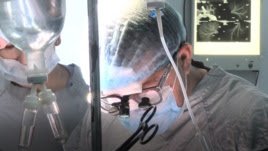Tajik mothers donate organs to save each other’s daughters
www.rferl.org/b76c7cea-7f1c-4de8-964e-9d88ba149ad8
High Asia Herald Report
Two Tajik girls were battling illnesses that threatened their lives unless they could undergo liver transplants. Last month, doctors told their mothers they’d found a perfect match: each woman could donate part of her liver to the other’s daughter.
The two Tajik women were brought together by a desperate search, says a documentary prepared by Radio Free Europe/Liberty Radio.
Zarnigor Sangova and Rukhshona Ahmadova had daughters whose lives were threatened by liver disease and there were no suitable organ donors available.
But in January doctors told them that they had found a solution. Each woman was a match for the other’s daughter. And each could donate a part of her own liver to save a child’s life.
“My daughter and I have lived in pain for five years. and my daughter was almost lost,” commented Rukhshana Ahmedova, one of the donor mothers.
“Zarnigor Sangova and I got to know each other. So I gave part of my liver to her daughter and she gave part of her liver to my daughter,” she said.
Tajik law normally requires that a living organ or tissue donor must be related to the recipients.
But the two women were allowed to present their case to a medical commission and received permission to proceed.
“We consulted with each other and agreed. We passed the commission hearing and agreed,” says Ms Zarnigor, another mother donor.
Then the surgery was performed successfully.
“Now I feel the same towards this woman’s [Rukhshana] daughter as I feel toward my own daughter,” she commented.
The transplant took place on January 31, 2020, just two weeks after the two women first met along with their daughters aged 9 and 10 years old.
The National Scientific Centre for Human Organ and Tissue Transplantation (NSCHOTT) in Dushanbe has carried out hundreds of kidney, liver and other organ transplants since it opened in 2011, says
Saimahmud Ismailzoda, Director, of the Centre.
“In 2019 we performed our first transplant surgeory involving minor children weighing under 10kilogram, he said.
In total, we performed 17 liver transplant and 125 kidney transplant surgeries in 2019, says Dr Ismoilzoda.
There are risks involved for donors and recipients such as infections and rejection of the donated organs.
But so far, it appears that the operations were successful with most partial liver transplants, the donor’s organ returns to full functioning within months.
Both mothers have high hopes for their daughters’ recovery after an ordeal that united their families.

The High Asia Herald is a member of High Asia Media Group — a window to High Asia and Central Asia

